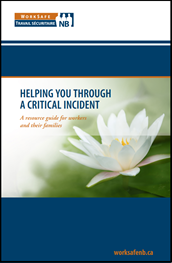


Our Helping You through a Critical Incident Guide is meant to provide helpful information as you grieve and struggle to adjust after a critical incident, such as a life-altering injury or a workplace fatality.
We hope to answer some of those questions in this guide, as well as identify some of the services and resources available to help you cope.

If you are the spouse or dependent of a worker who is killed at the workplace or dies from an occupational disease You may be entitled to benefits. You must apply within six months from the date of the accident for your claim to be assessed.
These benefits may include:

We know that a big worry with a workplace injury, illness or death is...How will we pay the bills?
We can help you with various services and types of compensation if you or a loved one is seriously injured or killed in a workplace accident. If you are injured at work and your claim is accepted, WorkSafeNB will usually:



![]()
If your work injury results in the permanent loss of use of any body part, you may (in addition to your loss of earnings benefits) be entitled to a lump sum award based on your level of impairment.
WorkSafeNB is mandated to enforce the Occupational Health and Safety (OHS) and its regulations. The OHS Act was established to help protect workers from workplace injury and illness.
Under the OHS Act, the employer must contact WorkSafeNB immediately when a worker is critically injured or killed at work. Generally, an investigation begins right away and is carried out by a specialist in incident investigations (investigations officer) to determine the causes and contributing factors and identify any violations of the OHS Act and regulations. Investigations also identify corrective actions and preventive measures to help avoid similar incidents. These investigations can take up to a year or more to complete.
Once the investigation is complete, WorkSafeNB’s legal counsel assesses whether charges are appropriate against workplace parties. If charges are deemed appropriate, WorkSafeNB provides a report and recommendations on charges to the Crown prosecutor’s office. Charges must be laid within two years from the incident date.
When fatalities occur, WorkSafeNB will provide a copy of the report to the Office of the Chief Coroner, who may hold an inquest.
Our investigations officers are here to help you and your loved ones navigate through next steps during this difficult time of grieving. Soon after the investigation begins, an investigations officer will contact the injured worker and/or the family to explain the process. Due to the nature of these incidents, confidential grief counselling services are available to family members on an interim basis. Initial counselling sessions are provided free to family members.
Focus on the steps you choose to take each day – small or large, few or many – that will move you forward. The majority of individuals experiencing acute stress disorder recover completely. If the disorder lasts more than four weeks, you should consult a physician as you may be at risk of developing post-traumatic stress disorder (PTSD).
Traumatic events can lead to either acute or post-traumatic stress disorders. If a psychologist or psychiatrist diagnoses the injured worker with a stress-related disorder, they may be eligible for compensation benefits.
For more information about making a claim, contact 1 800 999-9775.
Please know that others have shared similar journeys, and that many people are concerned and care about your well-being.

Threads of Life is a charitable organization dedicated to supporting families after a workplace fatality, life-altering injury or occupational disease.
Threads of Life helps survivors by offering:
We encourage you to contact them toll-free at 1 888 567-9490, or by email at contact@threadsoflife.ca.